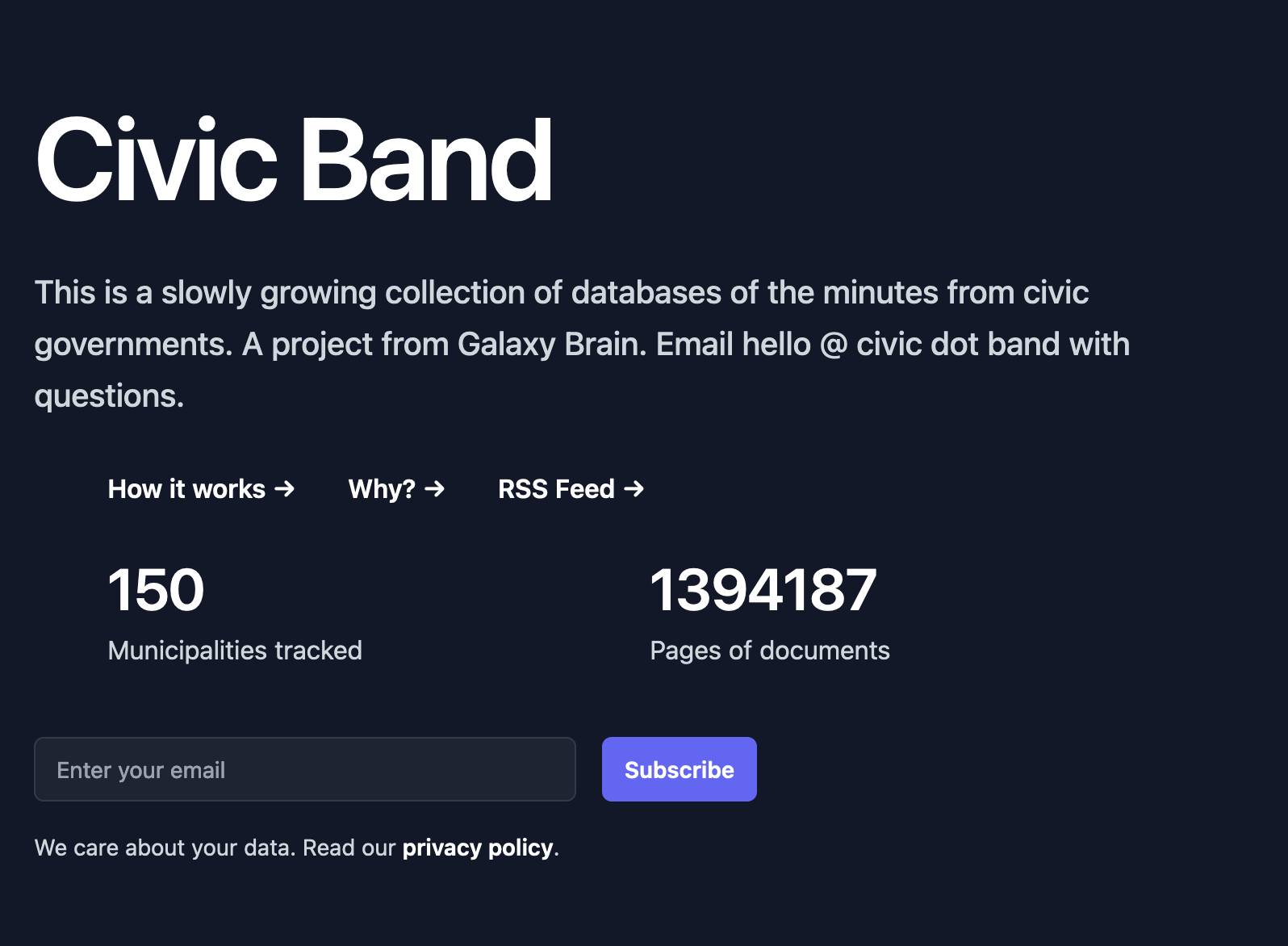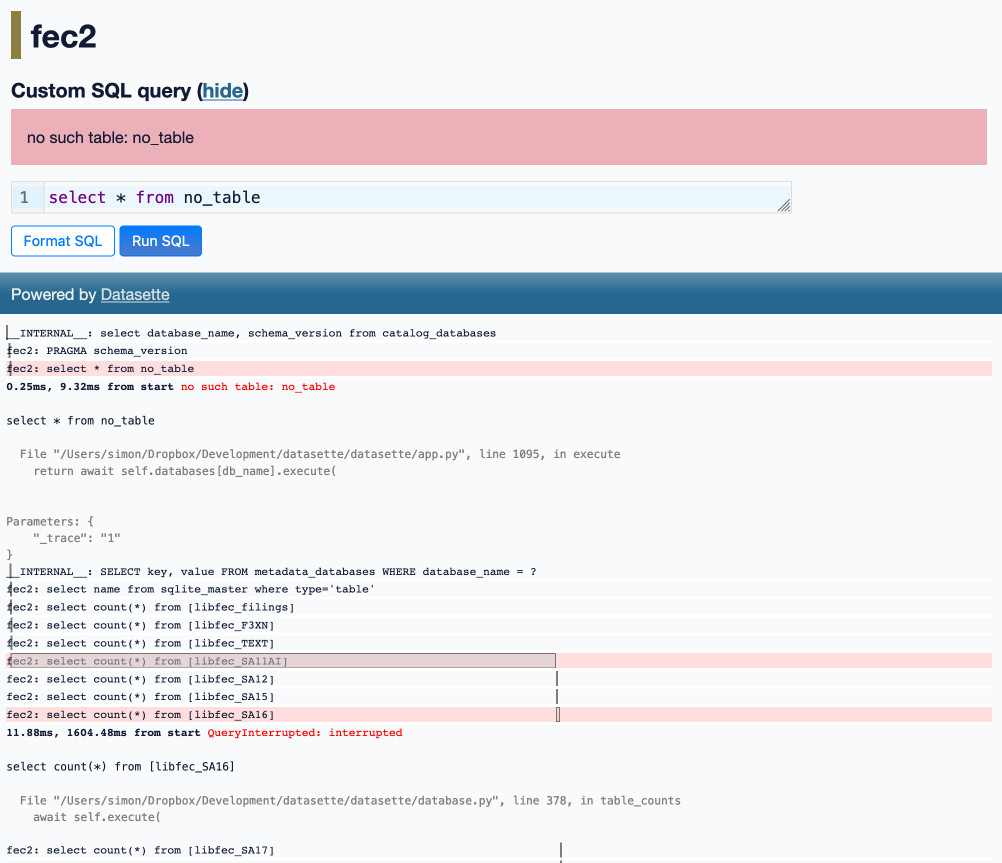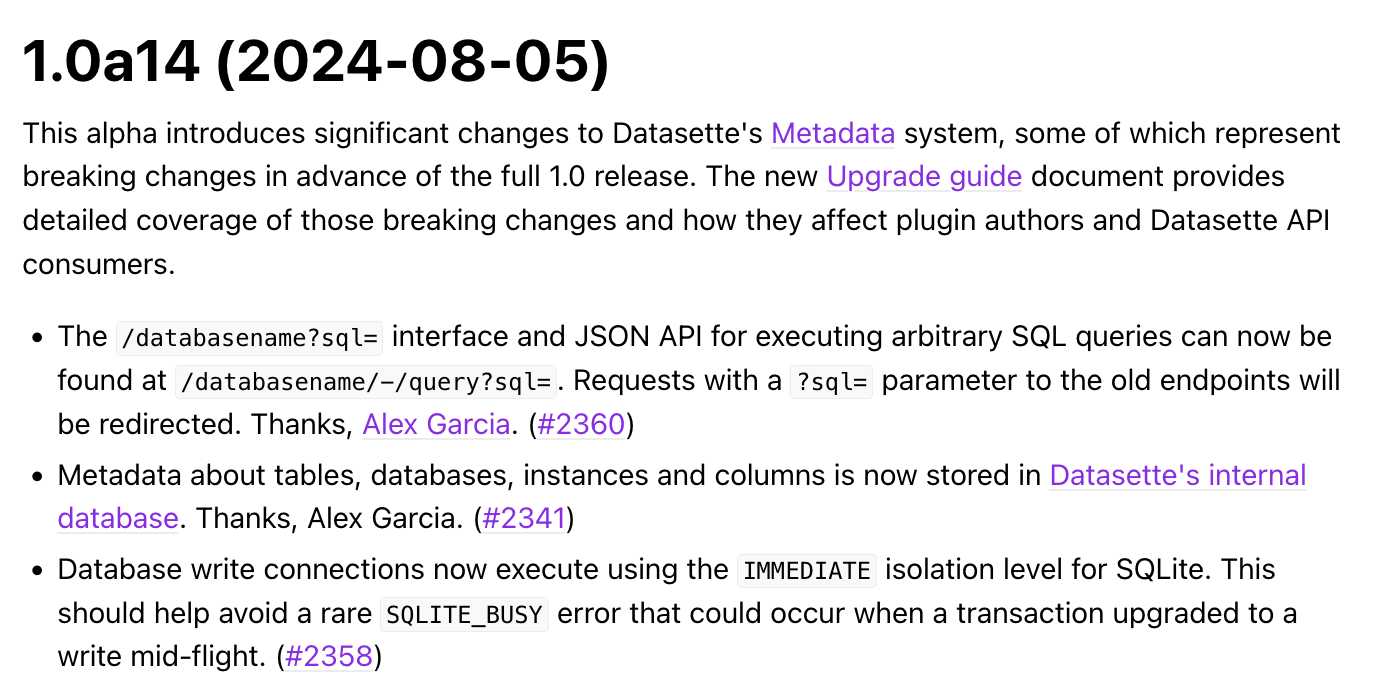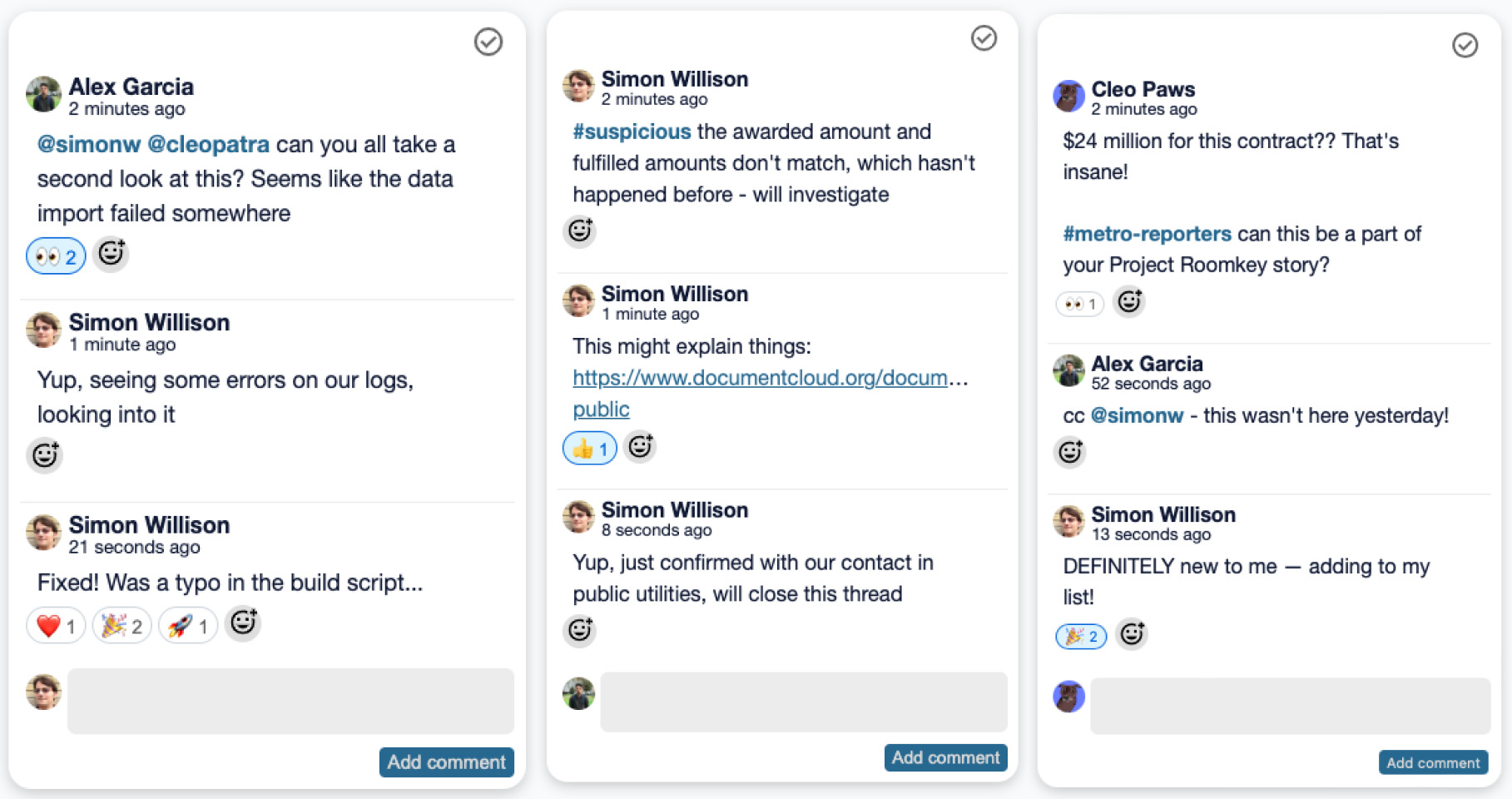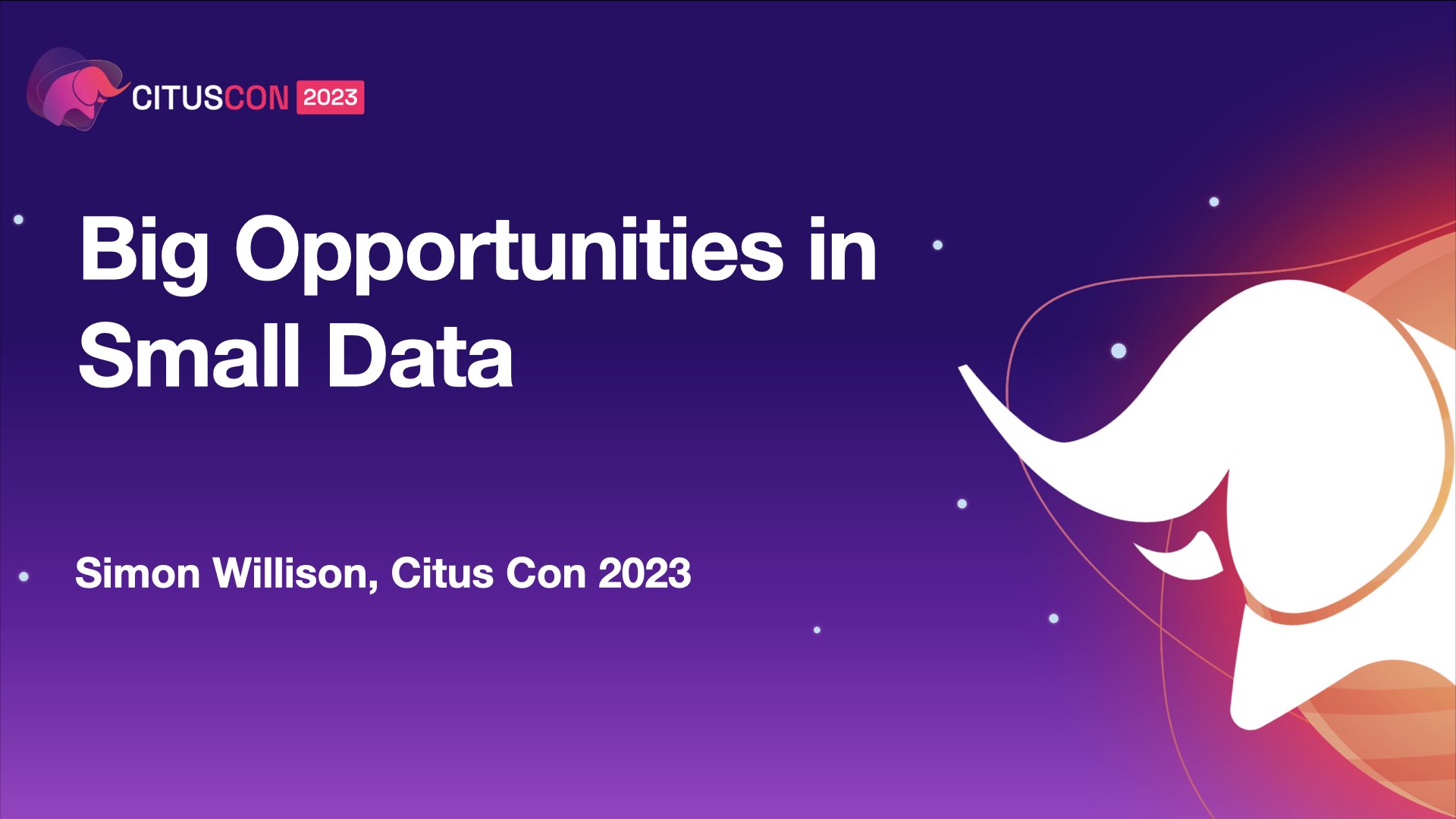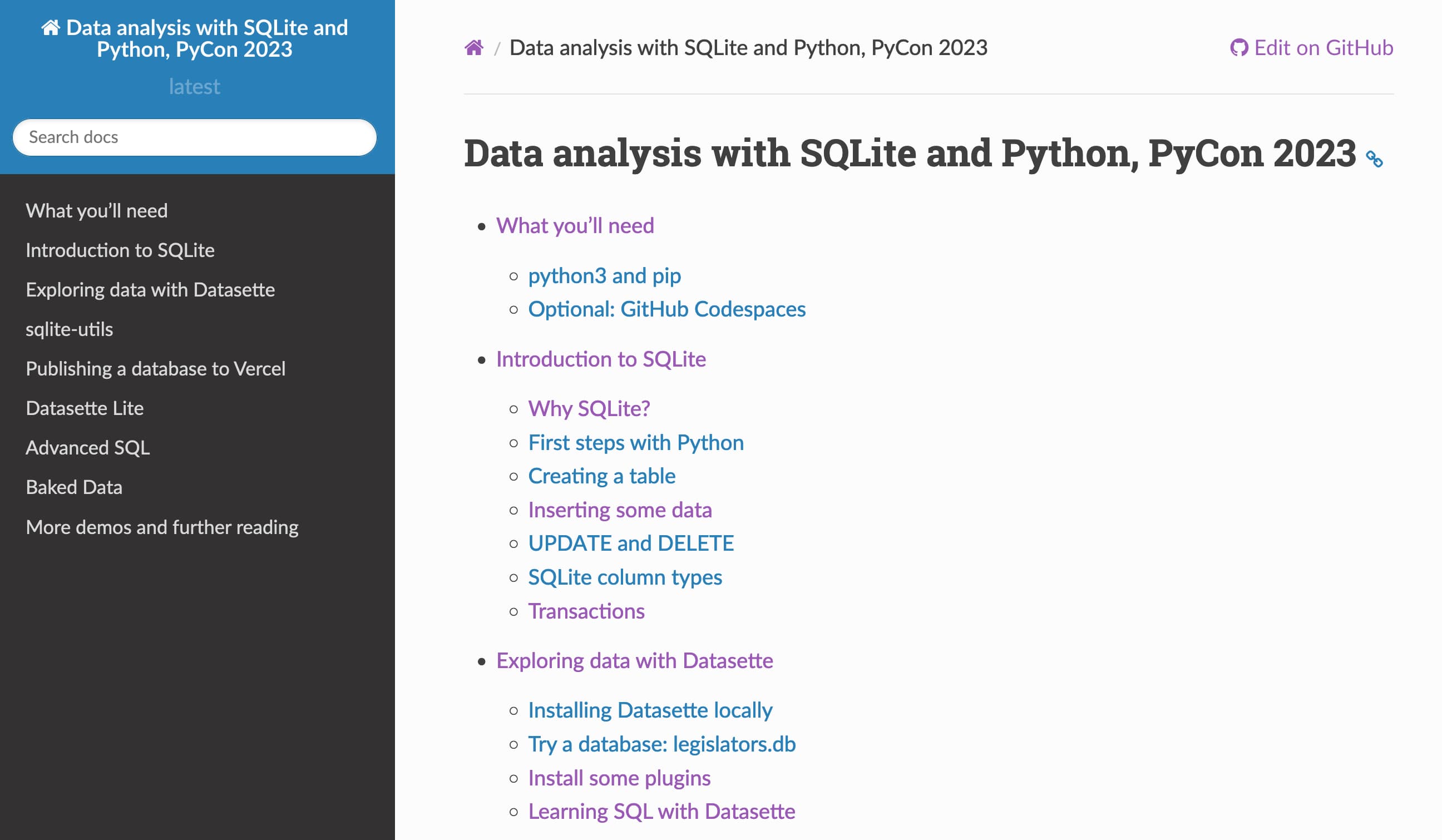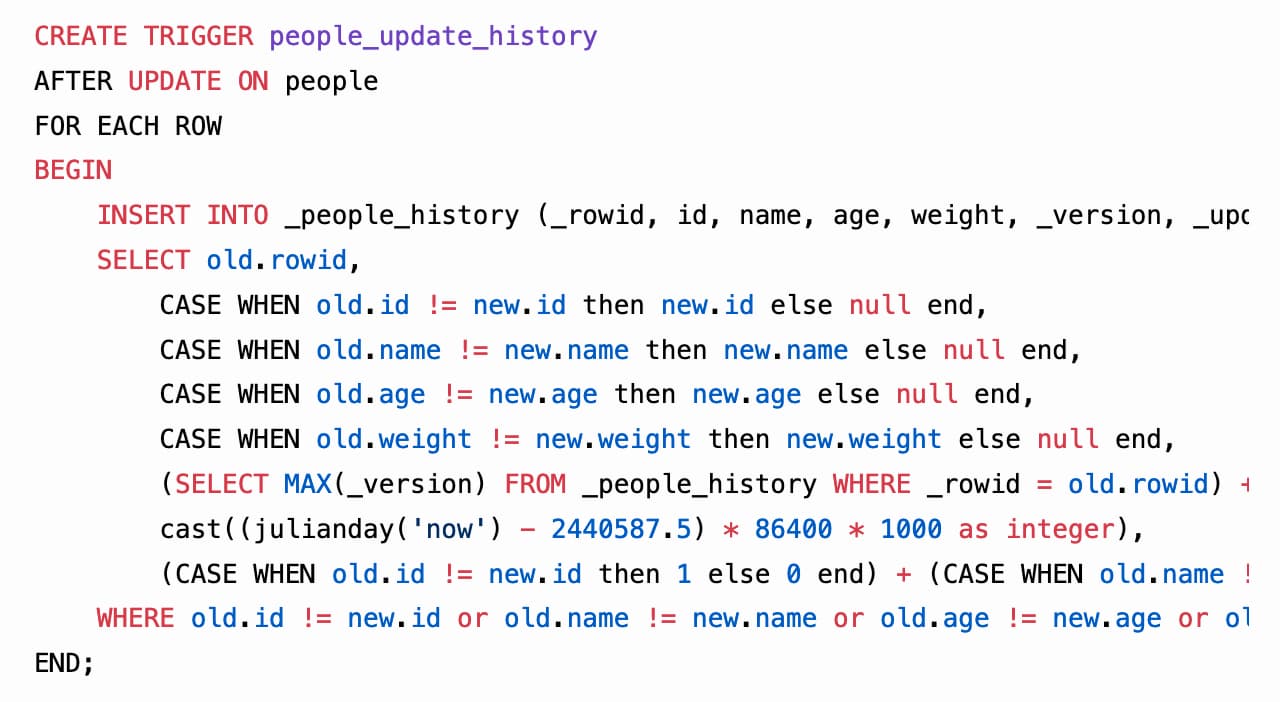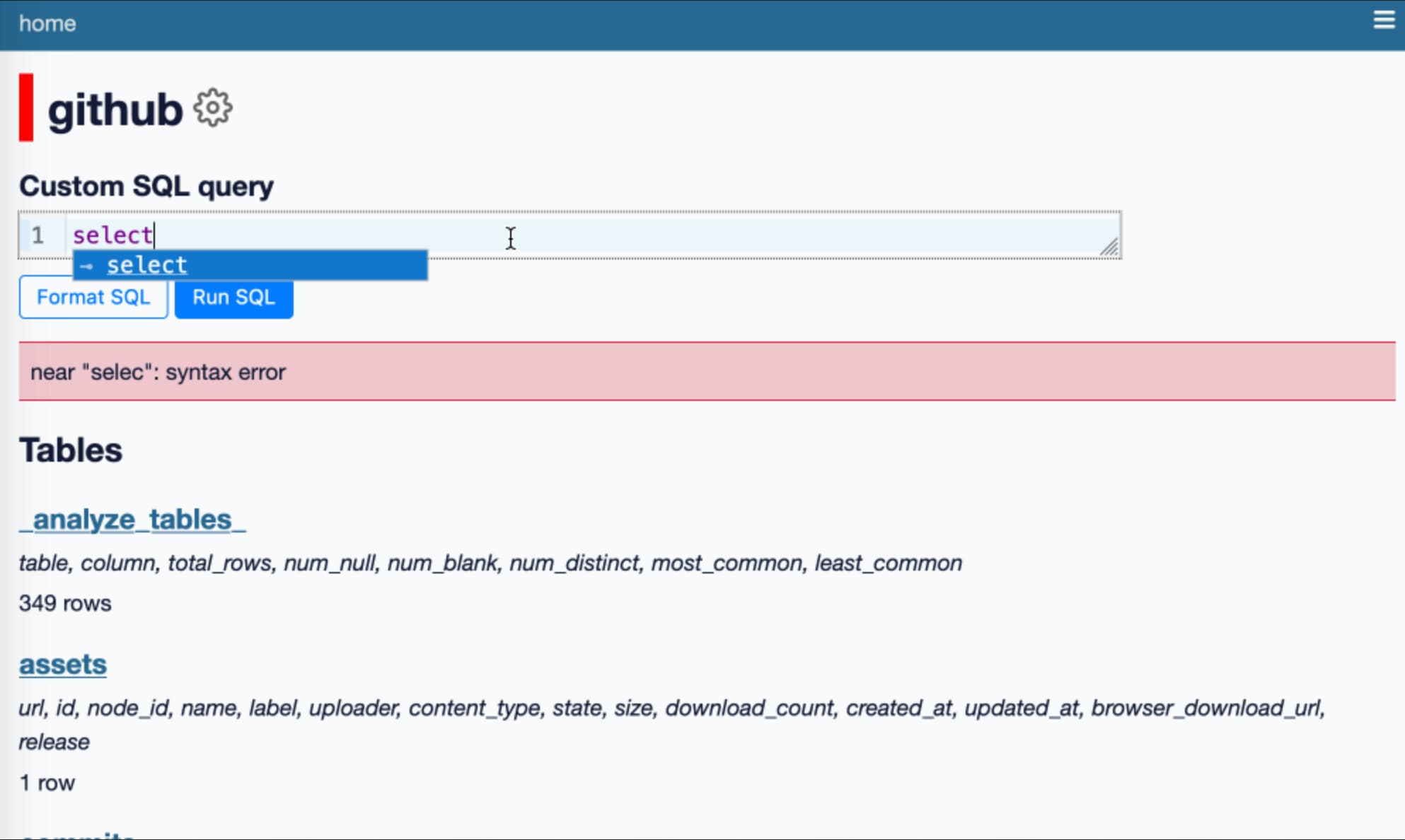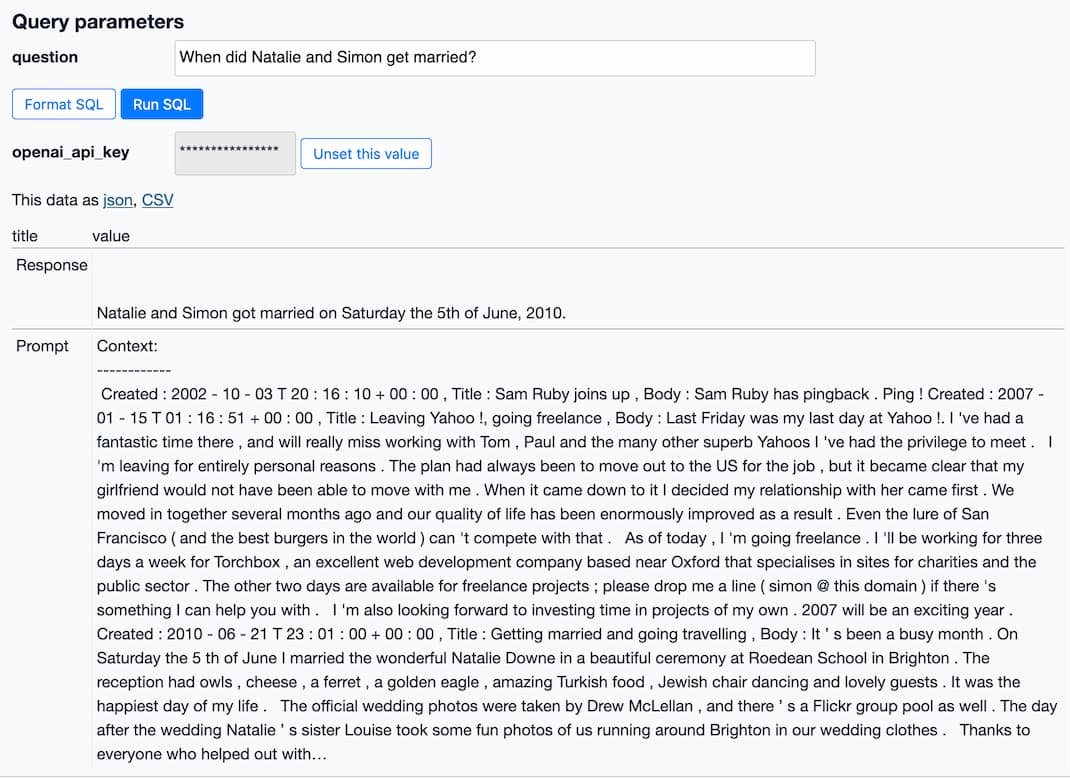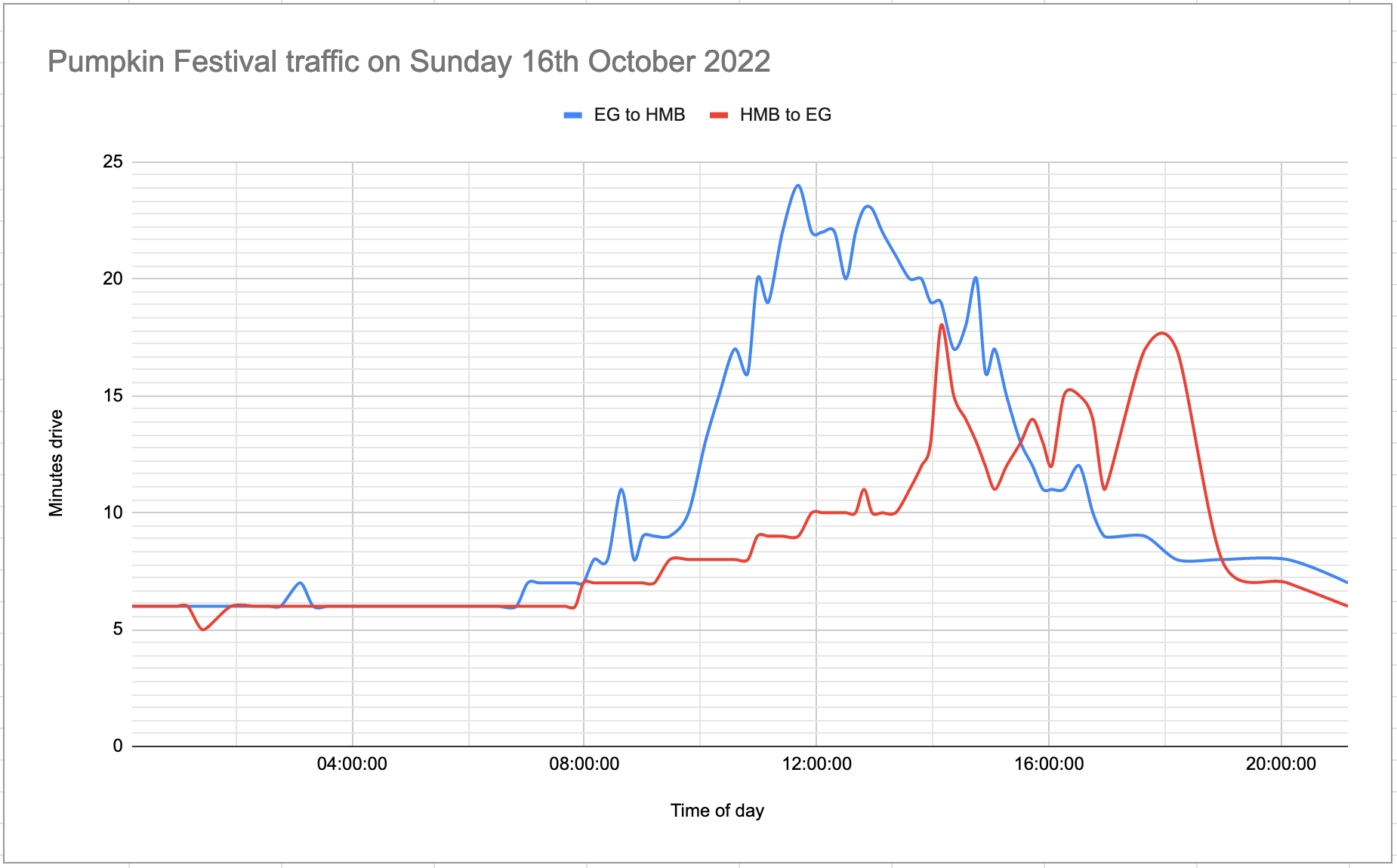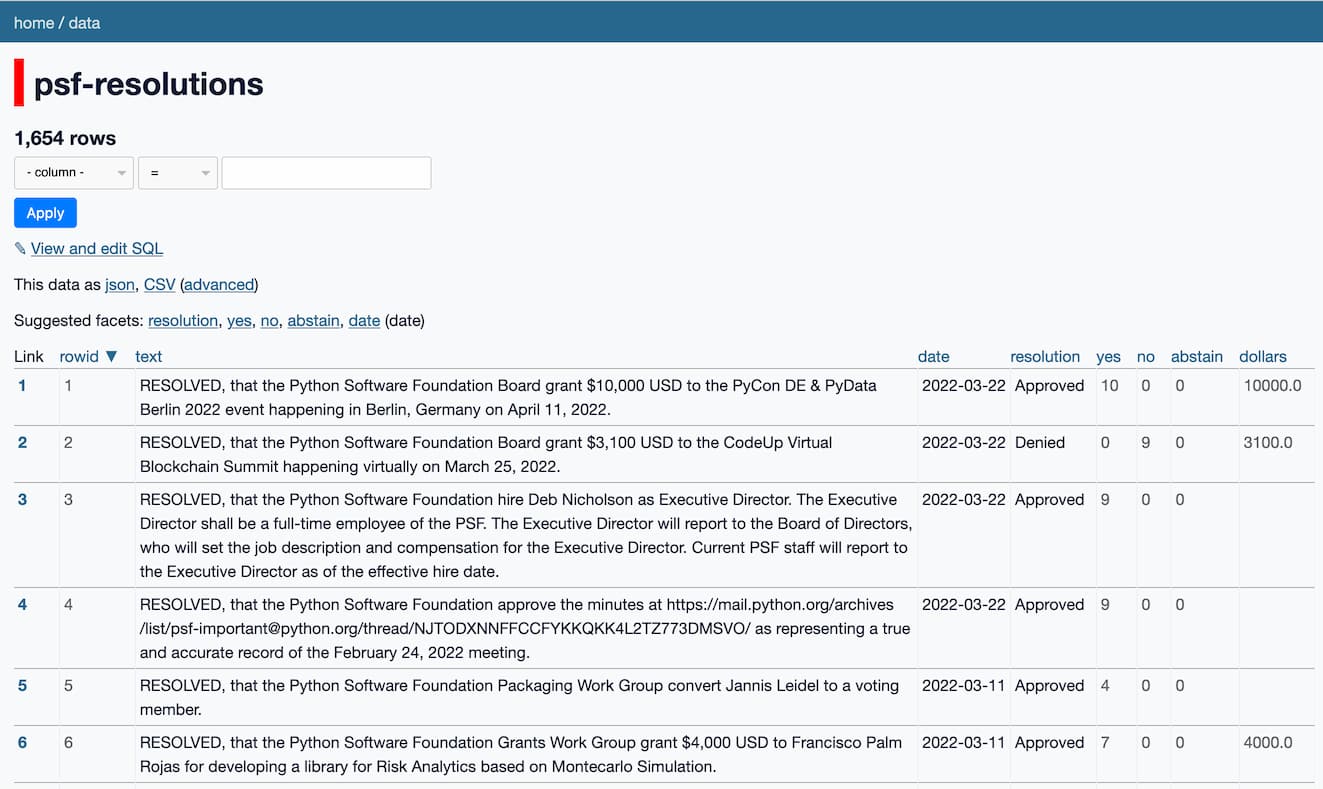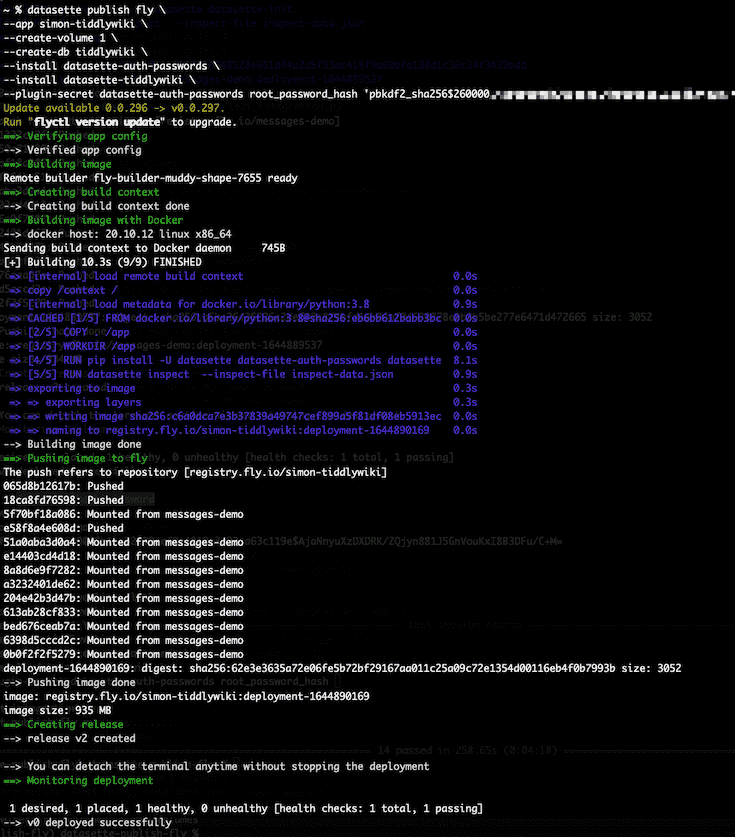Posts tagged sqlite, datasette
Filters: sqlite × datasette × Sorted by date
files-to-prompt 0.5.
My files-to-prompt tool (originally built using Claude 3 Opus back in April) had been accumulating a bunch of issues and PRs - I finally got around to spending some time with it and pushed a fresh release:
- New
-n/--line-numbersflag for including line numbers in the output. Thanks, Dan Clayton. #38- Fix for utf-8 handling on Windows. Thanks, David Jarman. #36
--ignorepatterns are now matched against directory names as well as file names, unless you pass the new--ignore-files-onlyflag. Thanks, Nick Powell. #30
I use this tool myself on an almost daily basis - it's fantastic for quickly answering questions about code. Recently I've been plugging it into Gemini 2.0 with its 2 million token context length, running recipes like this one:
git clone https://github.com/bytecodealliance/componentize-py
cd componentize-py
files-to-prompt . -c | llm -m gemini-2.0-pro-exp-02-05 \
-s 'How does this work? Does it include a python compiler or AST trick of some sort?'
I ran that question against the bytecodealliance/componentize-py repo - which provides a tool for turning Python code into compiled WASM - and got this really useful answer.
Here's another example. I decided to have o3-mini review how Datasette handles concurrent SQLite connections from async Python code - so I ran this:
git clone https://github.com/simonw/datasette
cd datasette/datasette
files-to-prompt database.py utils/__init__.py -c | \
llm -m o3-mini -o reasoning_effort high \
-s 'Output in markdown a detailed analysis of how this code handles the challenge of running SQLite queries from a Python asyncio application. Explain how it works in the first section, then explore the pros and cons of this design. In a final section propose alternative mechanisms that might work better.'
Here's the result. It did an extremely good job of explaining how my code works - despite being fed just the Python and none of the other documentation. Then it made some solid recommendations for potential alternatives.
I added a couple of follow-up questions (using llm -c) which resulted in a full working prototype of an alternative threadpool mechanism, plus some benchmarks.
One final example: I decided to see if there were any undocumented features in Litestream, so I checked out the repo and ran a prompt against just the .go files in that project:
git clone https://github.com/benbjohnson/litestream
cd litestream
files-to-prompt . -e go -c | llm -m o3-mini \
-s 'Write extensive user documentation for this project in markdown'
Once again, o3-mini provided a really impressively detailed set of unofficial documentation derived purely from reading the source.
Project: Civic Band—scraping and searching PDF meeting minutes from hundreds of municipalities
I interviewed Philip James about Civic Band, his “slowly growing collection of databases of the minutes from civic governments”. Philip demonstrated the site and talked through his pipeline for scraping and indexing meeting minutes from many different local government authorities around the USA.
[... 762 words]django-plugin-datasette. I did some more work on my DJP plugin mechanism for Django at the DjangoCon US sprints today. I added a new plugin hook, asgi_wrapper(), released in DJP 0.3 and inspired by the similar hook in Datasette.
The hook only works for Django apps that are served using ASGI. It allows plugins to add their own wrapping ASGI middleware around the Django app itself, which means they can do things like attach entirely separate ASGI-compatible applications outside of the regular Django request/response cycle.
Datasette is one of those ASGI-compatible applications!
django-plugin-datasette uses that new hook to configure a new URL, /-/datasette/, which serves a full Datasette instance that scans through Django’s settings.DATABASES dictionary and serves an explore interface on top of any SQLite databases it finds there.
It doesn’t support authentication yet, so this will expose your entire database contents - probably best used as a local debugging tool only.
I did borrow some code from the datasette-mask-columns plugin to ensure that the password column in the auth_user column is reliably redacted. That column contains a heavily salted hashed password so exposing it isn’t necessarily a disaster, but I like to default to keeping hashes safe.
Optimizing Datasette (and other weeknotes)
I’ve been working with Alex Garcia on an experiment involving using Datasette to explore FEC contributions. We currently have a 11GB SQLite database—trivial for SQLite to handle, but at the upper end of what I’ve comfortably explored with Datasette in the past.
[... 2,069 words]Using sqlite-vec with embeddings in sqlite-utils and Datasette. My notes on trying out Alex Garcia's newly released sqlite-vec SQLite extension, including how to use it with OpenAI embeddings in both Datasette and sqlite-utils.
Datasette 1.0a14: The annotated release notes
Released today: Datasette 1.0a14. This alpha includes significant contributions from Alex Garcia, including some backwards-incompatible changes in the run-up to the 1.0 release.
[... 1,424 words]UK Parliament election results, now with Datasette. The House of Commons Library maintains a website of UK parliamentary election results data, currently listing 2010 through 2019 and with 2024 results coming soon.
The site itself is a Rails and PostgreSQL app, but I was delighted to learn today that they're also running a Datasette instance with the election results data, linked to from their homepage!
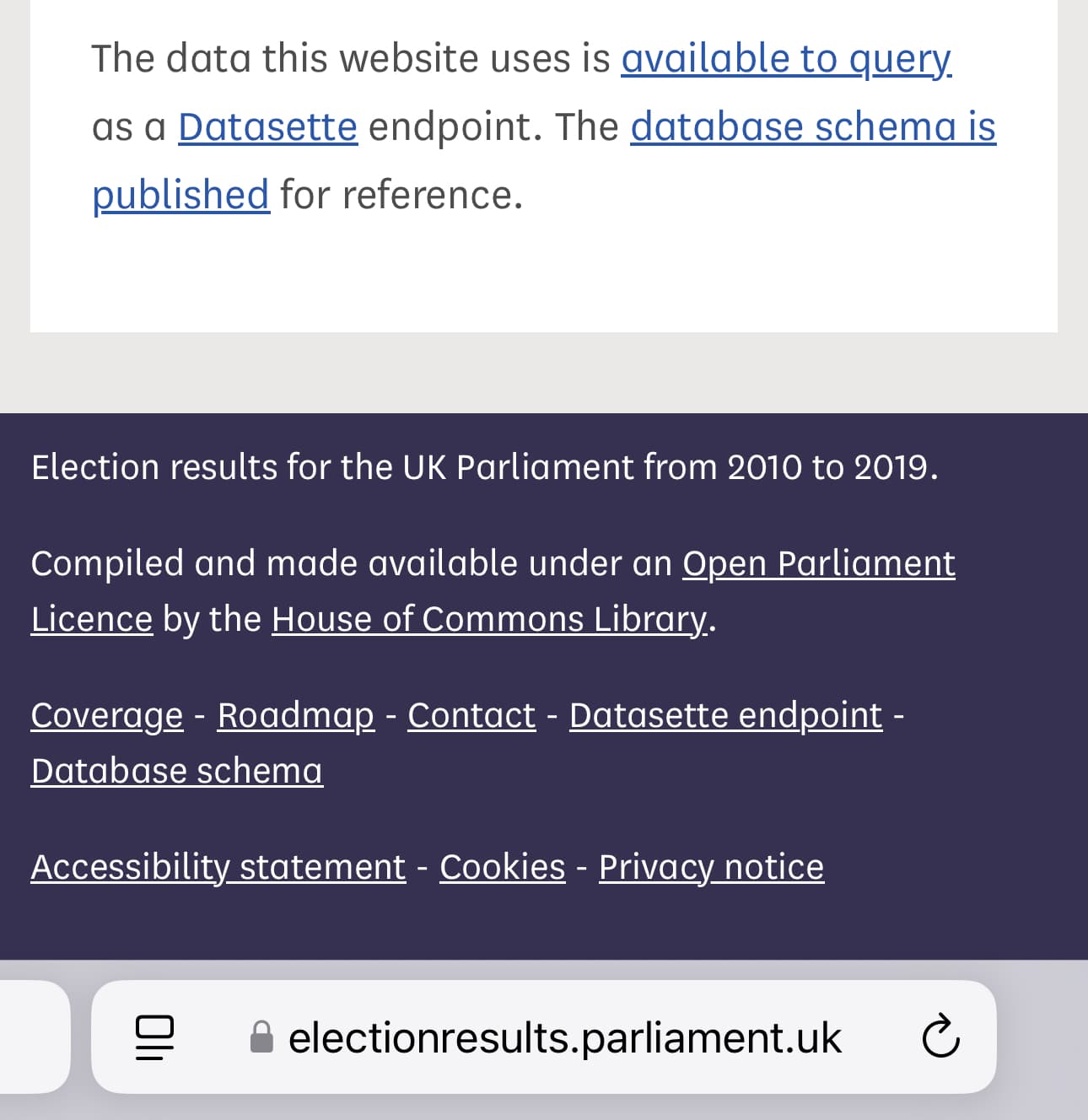
The raw data is also available as CSV files in their GitHub repository. Here's their Datasette configuration, which includes a copy of their SQLite database.
Datasette 0.64.7.
A very minor dot-fix release for Datasette stable, addressing this bug where Datasette running against the latest version of SQLite - 3.46.0 - threw an error on canned queries that included :named parameters in their SQL.
The root cause was Datasette using a now invalid clever trick I came up with against the undocumented and unstable opcodes returned by a SQLite EXPLAIN query.
I asked on the SQLite forum and learned that the feature I was using was removed in this commit to SQLite. D. Richard Hipp explains:
The P4 parameter to OP_Variable was not being used for anything. By omitting it, we make the prepared statement slightly smaller, reduce the size of the SQLite library by a few bytes, and help sqlite3_prepare() and similar run slightly faster.
Datasette 1.0a10. The only changes in this alpha release concern the way Datasette handles database transactions. The database.execute_write_fn() internal method used to leave functions to implement transactions on their own—it now defaults to wrapping them in a transaction unless they opt out with the new transaction=False parameter.
In implementing this I found several places inside Datasette—in particular parts of the JSON write API—which had not been handling transactions correctly. Those are all now fixed.
Weeknotes: datasette-enrichments, datasette-comments, sqlite-chronicle
I’ve mainly been working on Datasette Enrichments and continuing to explore the possibilities enabled by sqlite-chronicle.
[... 1,123 words]Weeknotes: the Datasette Cloud API, a podcast appearance and more
Datasette Cloud now has a documented API, plus a podcast appearance, some LLM plugins work and some geospatial excitement.
[... 1,243 words]Geospatial SQL queries in SQLite using TG, sqlite-tg and datasette-sqlite-tg. Alex Garcia built sqlite-tg—a SQLite extension that uses the brand new TG geospatial library to provide a whole suite of custom SQL functions for working with geospatial data.
Here are my notes on trying out his initial alpha releases. The extension already provides tools for converting between GeoJSON, WKT and WKB, plus the all important tg_intersects() function for testing if a polygon or point overlap each other.
It’s pretty useful already. Without any geospatial indexing at all I was still able to get 700ms replies to a brute-force point-in-polygon query against 150MB of GeoJSON timezone boundaries stored as JSON text in a table.
Introducing datasette-litestream: easy replication for SQLite databases in Datasette. We use Litestream on Datasette Cloud for streaming backups of user data to S3. Alex Garcia extracted out our implementation into a standalone Datasette plugin, which bundles the Litestream Go binary (for the relevant platform) in the package you get when you run “datasette install datasette-litestream”—so now Datasette has a very robust answer to questions about SQLite disaster recovery beyond just the Datasette Cloud platform.
Dependency Management Data (via) This is a really neat CLI tool by Jamie Tanna, built using Go and SQLite but with a feature that embeds a Datasette instance (literally shelling out to start the process running from within the Go application) to provide an interface for browsing the resulting database.
It addresses the challenge of keeping track of the dependencies used across an organization, by gathering them into a SQLite database from a variety of different sources—currently Dependabot, Renovate and some custom AWS tooling.
The “Example” page links to a live Datasette instance and includes video demos of the tool in action.
Data analysis with SQLite and Python. I turned my 2hr45m workshop from PyCon into the latest official tutorial on the Datasette website. It includes an extensive handout which should be useful independently of the video itself.
Vector Search. Amjith Ramanujam provides a very thorough tutorial on implementing vector similarity search using SentenceTransformers embeddings (all-MiniLM-L6-v2) executed using sqlite-utils, then served via datasette-sqlite-vss and deployed using Fly.
Big Opportunities in Small Data
I gave an invited keynote at Citus Con 2023, the PostgreSQL conference. Below is the abstract, video, slides and links from the presentation.
[... 385 words]Data analysis with SQLite and Python for PyCon 2023
I’m at PyCon 2023 in Salt Lake City this week.
[... 347 words]sqlite-history: tracking changes to SQLite tables using triggers (also weeknotes)
In between blogging about ChatGPT rhetoric, micro-benchmarking with ChatGPT Code Interpreter and Why prompt injection is an even bigger problem now I managed to ship the beginnings of a new project: sqlite-history.
[... 1,680 words]Introducing sqlite-vss: A SQLite Extension for Vector Search (via) This latest SQLite extension from Alex Garcia is possibly his best yet: it adds FAISS-powered vector similarity search directly to SQLite, enabling fast KNN similarity lookups against a virtual table that feels a lot like SQLite’s own built-in full text search feature. This write-up includes interactive demos using Datasette called from an Observable notebook, running similarity searches against an index of 200,000 news headlines and summaries in less than 50ms.
Weeknotes: A bunch of things I learned this week, plus datasette-explain
The Datasette table view refactor, JSON redesign and ?_extra= continues this week, mainly in this ongoing pull request and this tracking issue.
Making SQLite extensions pip install-able (via) Alex Garcia figured out how to bundle a compiled SQLite extension in a Python wheel (building different wheels for different platforms) and publish them to PyPI. This is a huge leap forward in terms of the usability of SQLite extensions, which have previously been pretty difficult to actually install and run. Alex also created Datasette plugins that depend on his packages, so you can now “datasette install datasette-sqlite-regex” (or datasette-sqlite-ulid, datasette-sqlite-fastrand, datasette-sqlite-jsonschema) to gain access to his custom SQLite extensions in your Datasette instance. It even works with “datasette publish --install” to deploy to Vercel, Fly.io and Cloud Run.
How to implement Q&A against your documentation with GPT3, embeddings and Datasette
If you’ve spent any time with GPT-3 or ChatGPT, you’ve likely thought about how useful it would be if you could point them at a specific, current collection of text or documentation and have it use that as part of its input for answering questions.
[... 3,491 words]Weeknotes: DjangoCon, SQLite in Django, datasette-gunicorn
I spent most of this week at DjangoCon in San Diego—my first outside-of-the-Bay-Area conference since the before-times.
[... 1,184 words]Measuring traffic during the Half Moon Bay Pumpkin Festival
This weekend was the 50th annual Half Moon Bay Pumpkin Festival.
[... 2,693 words]Introducing sqlite-html: query, parse, and generate HTML in SQLite (via) Another brilliant SQLite extension module from Alex Garcia, this time written in Go. sqlite-html adds a whole family of functions to SQLite for parsing and constructing HTML strings, built on the Go goquery and cascadia libraries. Once again, Alex uses an Observable notebook to describe the new features, with embedded interactive examples that are backed by a Datasette instance running in Fly.
Weeknotes: Joining the board of the Python Software Foundation
A few weeks ago I was elected to the board of directors for the Python Software Foundation.
[... 2,081 words]sqlite-comprehend: run AWS entity extraction against content in a SQLite database
I built a new tool this week: sqlite-comprehend, which passes text from a SQLite database through the AWS Comprehend entity extraction service and stores the returned entities.
[... 1,146 words]SQLite Happy Hour—a Twitter Spaces conversation about three interesting projects building on SQLite
Yesterday I hosted SQLite Happy Hour. my first conversation using Twitter Spaces. The idea was to dig into three different projects that were doing interesting things on top of SQLite. I think it worked pretty well, and I’m curious to explore this format more in the future.
[... 1,998 words]Using SQLite and Datasette with Fly Volumes
A few weeks ago, Fly announced Free Postgres Databases as part of the free tier of their hosting product. Their announcement included this snippet:
[... 1,463 words]